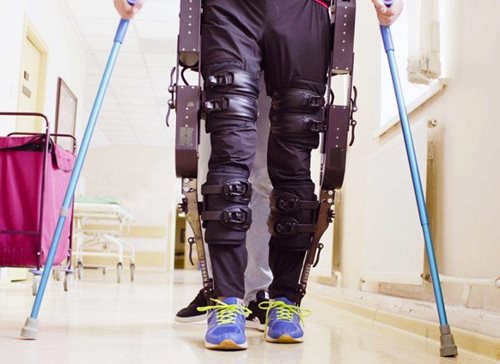 Image: © Chudakov/Stock.adobe.com
Image: © Chudakov/Stock.adobe.com
Inspirefest 2019 speaker Mark Pollock and Dublin City University (DCU) have teamed up to launch the Exoskeleton Programme, which will provide free access to robotic rehabilitation for people who have been affected by paralysis.
Led by physiotherapists, the service will give people with reduced mobility – such as those who live with a spinal cord injury, stroke, traumatic brain injury, multiple sclerosis or Parkinson’s disease – access to the Ekso Bionics exoskeleton. Using this advanced equipment, they will be able to complete a number of sessions with a trained handler to help them to walk again.
The clinical lead for the programme is neurorehabilitation physiotherapist Ronan Langan, who was present at the official launch last month at DCU with Pollock.
“Using exoskeleton technology, we are incorporating experts from DCU in health, body systems, biomechanics and engineering to maximise and improve service user’s mobility, health and quality of life,” Langan said.
“And, by combining these disciplines and our team’s extensive knowledge of neurological injury and neurorehabilitation, we aim to make a meaningful impact into the research of better therapies for paralysis now and into the future.”
‘Finding a cure for paralysis is a human crisis’
In 1998, Pollock became blind but went on to compete in ultra-endurance races across deserts, mountains and the polar ice caps. Then, in 2010, a freak accident saw him fall from a second-storey window, resulting in a spinal cord injury that left him paralysed from the stomach down and facing the fact that he will likely never walk again.
However, Pollock and his partner Simone George have worked closely with scientists led by UCLA’s Reggie Edgerton, the world’s leading authority on electrical stimulation of the spinal cord, to create an innovative collaboration using technology from NeuroRecovery Technologies and Ekso Bionics.
Pollock is now regarded as the world’s leading test pilot for Ekso Bionic robotics legs and to date has taken more than 1.5m steps using the device.
Speaking at the launch, Pollock said: “Finding a cure for paralysis is a human crisis requiring people to work together across geographical, organisational and intellectual boundaries.
“So, I’m focused on catalysing collaborations that have never been done before to make that cure a reality.”
Colm Gorey
This article first appeared on www.siliconrepublic.com and can be found at:
https://www.siliconrepublic.com/machines/paralysis-exoskeleton-rehab-dcu-mark-pollock



